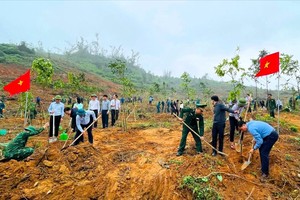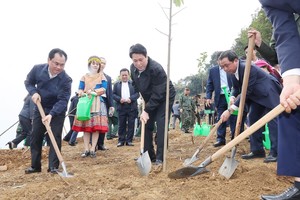
The Ministry of Natural Resources and Environment has recently provided an update regarding the enforcement of the Land Law across various localities throughout the country. It has been noted that the volume of documents required for development by local authorities is substantial.
Additionally, certain aspects of the regulations are subject to varying interpretations, which necessitates further consultation. These factors contribute to the challenges faced in the implementation of the Land Law.
According to the Ministry of Natural Resources and Environment, after three months of implementing the Land Law and documents guiding its implementation, these new policies have initially proven to bring about effectiveness in implementing the rights of land users, land recovery, compensation, support, resettlement, land valuation, and issuance of Land Use Right Certificates.
New regulations have also gained agreement among every walk of life, businesses, and agencies from the central and local level.
The Ministry of Natural Resources and Environment has reported that, based on an assessment of the current circumstances and feedback from local areas during the inspection process, the inspection team identified several challenges and impediments in the execution of the Land Law.
There are seven specific difficulties and obstacles in the implementation process. To begin with, the adjustment of the early effective date for the Land Law, Housing Law, and Real Estate Business Law, along with the related documents that are set to take effect on August 1, 2024, has left localities in a somewhat passive position.
Secondly, it is quite challenging for localities to create and implement documents within their authority in a way that ensures they take effect simultaneously with laws and decrees. At the same time, the number of specialized staff in the payroll of agencies leading this process remains small.
Thirdly, the legislation delegates a significant degree of regulatory authority to provincial governments. Many of these delegated regulations are complex and require considerable time and effort to implement. Furthermore, several practical challenges have not yet manifested at the local level, such as the regulation of social housing built by private individuals for rental or worker accommodation.
The regulations delegated to the provinces under the new laws contain numerous elements, some of which are quite intricate and require significant time to navigate. Additionally, there are various practical aspects that have yet to emerge in the local context. For instance, the establishment of social housing intended for rental by individuals, as well as accommodations for workers, are noteworthy examples.
Fourthly, certain legal documents related to the implementation of the Land Law and the Housing Law are of significant importance. Therefore, sufficient time is needed to gather public feedback and suggestions to ensure compliance with legal regulations. This process, however, often results in delays in the issuance of these documents.
Fifthly, the number of qualified staff in specialized departments assigned to draft legal documents is insufficient. Furthermore, these staff often face time constraints that hinder their ability to fully comprehend the spirit of the law and its implementing decrees.
Sixthly, there are discrepancies in the interpretation of certain provisions among local agencies, prompting some to request clarification from specialized ministries and branches. Seventh, challenges remain in adjusting the land price list to extend its applicability to December 31, 2025, as well as in planning work, land use planning, land price list preparation, land price determination, and surveying.
In response to the challenges outlined, the Inspection Team from the Ministry of Natural Resources and Environment engaged in direct discussions with local authorities. They offered guidance and proposed actionable solutions to help overcome the challenges faced during the implementation of the Land Law.
























